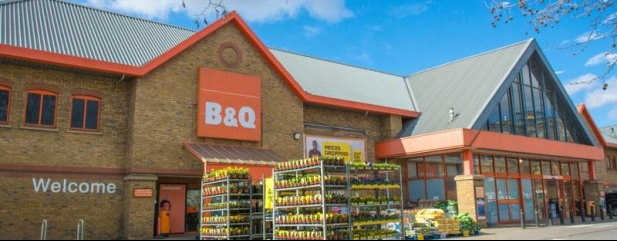Archived article
Please note that tax, investment, pension and ISA rules can change and the information and any views contained in this article may now be inaccurate.
Why there’s room for improvement at Kingfisher

Kingfisher (KGF) 223.5p
Market cap: £4.27 billion
Investors seeking to buy a retail market leader whose shares look just too cheap should peck away at Kingfisher (KGF), the home improvement giant behind the B&Q and Screwfix store chains. Shares concedes we could be a touch early with our ‘buy’ call, since the £4.3 billion cap is grappling with fragile consumer confidence, particularly in France, and EPS (earnings per share) estimates have been revised down accordingly.
Nevertheless, the trade should appeal to risk-tolerant investors as the challenges Kingfisher faces are more than reflected in a single digit forward PE (price-to-earnings) ratio and a dividend yield north of 5.5%. And we see scope for a significant re-rating as improving consumer confidence meets an uptick in housing market activity. An earnings upgrade cycle could even kick in as soon as Kingfisher’s full year results announcement on 25 March.
DOMINANT FORCE IN DIY
Kingfisher is a home improvement retailer operating in eight countries across Europe under the B&Q, Castorama, Brico Depot, Screwfix, TradePoint and Koctas brands. Crucially, these banners occupy the number one or two positions in the company’s key markets which include the UK & Ireland, France, Poland, Iberia and Romania.
The FTSE 100 powerhouse sells its home improvement products and services to consumers and trade professionals alike, both in-store and online. And despite the recent cycle of downgrades driven by inflationary pressures, the impact of the cost-of-living squeeze on big ticket spending as well as some unseasonable weather, chief executive Thierry Garnier remains ‘very positive’ about the medium-to-longer term outlook for home improvement growth in Kingfisher’s markets and the company’s ability to outperform.
ROOM FOR IMPROVEMENT
Kingfisher’s earnings are cyclical, but importantly they have grown steadily over time, and while profitability has come under pressure in the short term, moderating inflation and the peak in interest rates should boost consumer confidence and eventually lift earnings at the B&Q-to-Screwfix owner.
At the third quarter results (22 November), the group downgraded its year to 31 January 2024 adjusted pre-tax profit guidance from £590 million to £560 million to reflect weakness in the French market which continued from the third quarter into the opening weeks of the final quarter.
Encouragingly, consumer confidence across the channel recently turned upwards, while for the new financial year Kingfisher is lapping some especially soft like-for-like sales comparatives in its French and Polish businesses so it should be able to show a return to growth.
In the UK and Ireland, smaller rival Wickes (WIX) reported strong fourth-quarter trading and raised its full-year guidance, while a key takeaway from the remarkable 3.4% rebound in UK retail sales volumes in January was the 1.8% rise seen in household goods store sales, boosted mainly by sales in hardware stores.
We expect the B&Q, TradePoint and Screwfix chains to show resilience and gain market share, with Screwfix, which is expanding overseas and recently launched as a pure-play online retailer in six new European countries, likely to prove a standout performer once again.
BARGAIN BASEMENT RATING
The company-compiled consensus calls for a 2.6% decline in group like-for-like sales for the year to January just ended, improving to flat in the year to January 2025 ahead of a 1.7% rise in same-store sales for full year 2026, when Kingfisher’s adjusted pre-tax profit is forecast to rebound from £574 million to £640 million.
Based on EPS estimates for the next two years, Kingfisher trades on a lowly rating which is back to the levels last seen during the Great Financial Crisis and Covid pandemic in 2009 and 2020 respectively.
As such, the shares not only offer investors a margin of safety but also an attractive 5.5% dividend yield. Meanwhile, the free cash flow-generative DIY product powerhouse is pressing ahead with an EPS-enhancing £300 million share buyback, which should underpin the share price.
Lastly, as the bidding war for electronics seller Currys (CURY) demonstrates, if the market won’t recognise the value in a retail market leader, predators will start circling before long.
Important information:
These articles are provided by Shares magazine which is published by AJ Bell Media, a part of AJ Bell. Shares is not written by AJ Bell.
Shares is provided for your general information and use and is not a personal recommendation to invest. It is not intended to be relied upon by you in making or not making any investment decisions. The investments referred to in these articles will not be suitable for all investors. If in doubt please seek appropriate independent financial advice.
Investors acting on the information in these articles do so at their own risk and AJ Bell Media and its staff do not accept liability for losses suffered by investors as a result of their investment decisions.
Issue contents
Editor's View
Feature
Great Ideas
Money Matters
News
- Why interest in Currys could spark further mergers and acquisitions in the sector
- What have the top US fund managers been doing recently?
- XP Power plummets to 10-year low after two successive profit warnings
- YouGov looks in great shape amid talk of move to US listing
- Uber unveils $7 billion buyback as ride hailing firm shocks investors
 magazine
magazine








